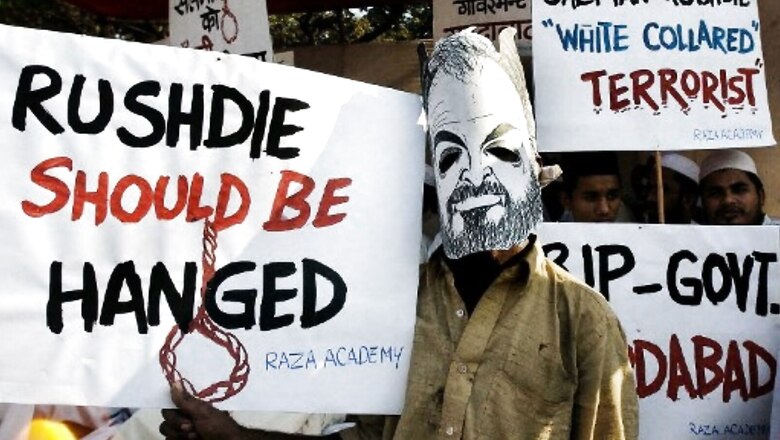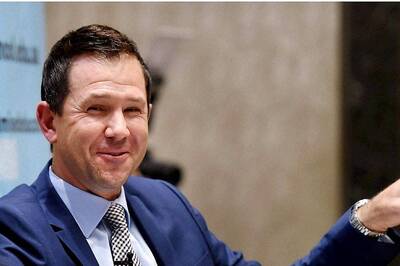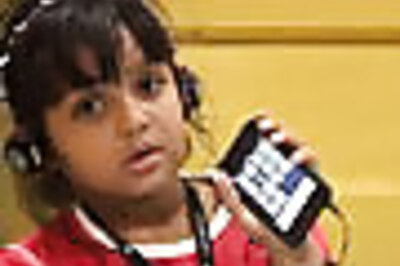
views
British author Salman Rushdie, whose writings have made him the target of Iranian death threats, was attacked on Friday at a literary event in New York state. Rushdie could lose an eye and has suffered liver damage after he was repeatedly stabbed.
The Mumbai-born British author rose to prominence with his Booker Prize-winning 1981 novel “Midnight’s Children,” but he became known globally after “The Satanic Verses.”
Shot to Fame
The controversial author was propelled into the spotlight with his second novel “Midnight’s Children” in 1981. The book won international praise and Britain’s prestigious Booker Prize for its portrayal of post-independence India.
Apart from winning the Booker prize, Midnight’s Children was judged to be the best ever winner of the Booker prize in 2008. Midnight’s Children, is an autobiography that follows a magical child born at the stroke of midnight and narrates India’s history post its independence.
He was born in India to non-practicing Muslims and today identifies as an atheist. He was forced to go underground as a bounty was put on his head, which remains even today.
Violent Protests
Rushdie’s fourth novel “The Satanic Verses” was viewed as blasphemous by many Muslims, who saw the character of the novel as an insult to the Prophet Muhammad. There were protests around the world against Rushdie after the novel was published in 1988. One of the protests turned violent in Mumbai leading to 12 deaths in Rushdie’s hometown Mumbai.
Death Fatwa
On February 14, 1989 Khomeini called for him to be killed for writing “The Satanic Verses”, which the cleric said insulted Islam.
In a fatwa, or religious decree, Khomeini urged “Muslims of the world rapidly to execute the author and the publishers of the book” so that “no one will any longer dare to offend the sacred values of Islam.”
Khomeini, who was 89 and had just four months to live, added that anyone who was killed trying to carry out the death sentence should be considered a “martyr” who would go to paradise.
Rushdie was placed under police protection in the UK for nine years and resulted in diplomatic breakdown between Iran and Britain.
Iran’s current Supreme Leader Ayatollah Ali Khamenei has never issued a fatwa of his own withdrawing the edict, though Iran in recent years hasn’t focused on the writer.
In a 2012 talk in New York, Rushdie said that terrorism is really the art of fear. “The only way you can defeat it is by deciding not to be afraid,” he reportedly said. He spent nearly a decade in hiding, moving houses repeatedly and being unable to tell his children where he lived.
First attempted killing
In August 1989, a bomb was planted at a hotel in central London by Mustafa Mazeh, a Lebanese man. However, the bomb went off while killing Mazeh while he was setting up the explosive, a report in The Guardian said.
Translators attacked, one died
Anti-Rushdie sentiment has lingered long after Khomeini’s fatwa. According to The Index on Censorship, an organization promoting free expression, money was raised to boost the reward for his killing as recently as 2016.
Even though Rushdie had managed to escape harm till the recent incident, the Japanese translator of the controversial book, Hitoshi Igarashi, was stabbed to death in 1991.
The Italian translator, Ettore Capriolo, was also seriously injured in another stabbing incident in 1991, while the Norway publisher William Nygaard was shot three times in 1993 but he survived.
Controversial Marriage
Rushdie married four times and all of the marriages ended up in divorce. His fourth and last marriage was to Indian-American model and author Padma Lakshmi, however, the couple split in 2007, three years after the marriage.
Lakshmi wrote in her memoir about how the author “was sexually needy and not an understanding husband.”
Read the Latest News and Breaking News here




















Comments
0 comment